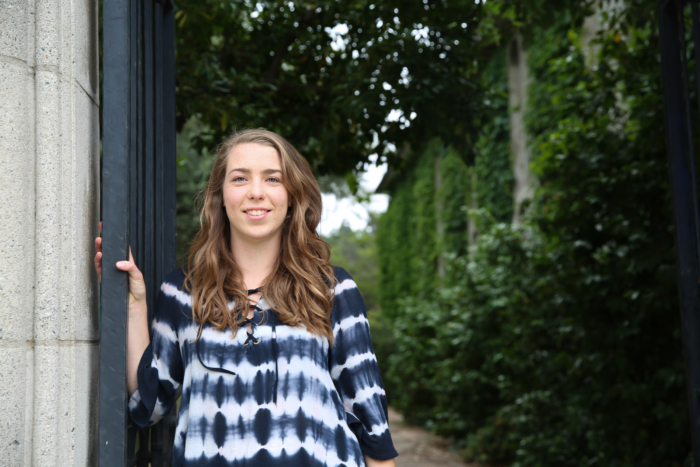
Why is it that most people agree to police searches when their vehicles are pulled over, even when it is within their right to decline? How are judges and lawyers typically portrayed in film and television, in terms of their race and gender? These are some of the questions that Mariah Farris ’18 will explore this summer, working alongside Scripps Associate Professor of Psychology Jennifer Groscup. Awarded a Mellon Undergraduate Research Fellowship, Farris will assist Groscup with her ongoing research on the Fourth Amendment as well as conduct her own analysis of stereotypes in popular media portrayals of the U.S. legal system.
Growing up in Davis, California, with a mother who is a psychologist and a father who is an archeologist, Farris says that the social sciences were heavily emphasized in her family. Taking her first few years at Scripps to explore each department within the social sciences, Farris decided on a psychology major and Hispanic studies minor. She hopes ultimately to pursue a career in education and believes that a degree in psychology will provide her with foundational skills necessary for work in the educational system.
“Ultimately, I plan to work more in the field of education than law, but within education I am particularly interested in the discrepancies between experiences of students based on their race, gender, and socioeconomic status,” she says.
“Both institutions demonstrate clear patterns of discrimination and are increasingly connected, as the presence of law enforcement in schools seems to be growing.”
Groscup’s research has focused on the ways in which a person’s race and gender affect how they are treated by the legal system as well as the factors that influence their ability to exercise their legal rights. Currently, she is working on a study about consent searches that occur when vehicles are pulled over by the police. Research has shown that most people will agree to a search, even when they know they have illegal items in their car on or on their person, or when the police officer informs them that they have the right to refuse the search. Groscup is curious as to why so few people refuse these searches, and Farris will help her continue to investigate this topic with experimental research this summer.
“The study should inform us about the coercive elements of these interactions, and could be used to influence legislation surrounding consent searches,” Farris believes.
For her own research on representations of lawyers and judges in film and television, Farris is aiming to develop a coding system to analyze portrayals of these figures based on race and gender. Focusing on recent media to gain an understanding of current trends, Farris says, “I’ll be looking for the ways in which these portrayals might perpetuate racial and gendered stereotypes and will explore the potential negative impact of those.” After taking classes with Groscup this semester, Farris’ interest in conducting research has grown, and she is looking forward to the opportunity to pursue her own project with her guidance.
Farris is delighted to be selected for the Mellon Undergraduate Research Fellowship and excited to have this experience the summer before she returns to Scripps to write her senior thesis.
“I think the Mellon Fellowships provide wonderful opportunities for humanities and social sciences majors to conduct research, and highly recommend to students within those disciplines that they consider applying,” she says.

